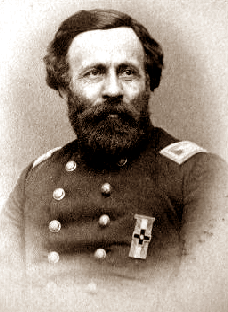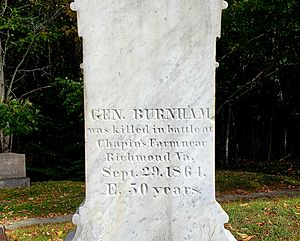Hiram Burnham facts for kids
Quick facts for kids
Hiram Burnham
|
|
|---|---|

Colonel Hiram Burnham, ca. 1862
|
|
| Born | 1814 Narraguagus, Maine, US |
| Died | September 29, 1864 (aged 49–50) Richmond, Virginia, US |
| Place of burial |
Pine Grove Cemetery, Cherryfield, Maine
|
| Allegiance | United States Union |
| Service/ |
United States Army Union Army |
| Years of service | 1861–1864 |
| Rank | |
| Commands held | 6th Maine Infantry Light Division, VI Corps |
| Battles/wars | Aroostook War American Civil War |
| Other work | Coroner, lumberman, county commissioner |
Hiram Burnham (born 1814 – died September 29, 1864) was a brave officer in the Union Army during the American Civil War. He led a group of soldiers called a regiment and later a larger group called a brigade. He fought in many important battles in the eastern part of the United States. Sadly, he was killed in battle while fighting near Richmond, Virginia. This happened during the Battle of Chaffin's Farm.
Contents
Early Life and Career
Hiram Burnham was born in Narraguagus, which is now Cherryfield, Maine, in 1814. When he was younger, he created and led a local group of citizen soldiers called a militia company. He was their captain during the Aroostook War in 1839.
After this, he worked as a lumberman, which means he worked with wood and timber. He even owned his own sawmill. Burnham was also active in local government. He served as a county commissioner, helping to manage the county's affairs. He also worked as a coroner, investigating deaths. People described him as a strong man with a loud voice, which was very useful on a battlefield.
Civil War Service
Joining the Army of the Potomac
When the Civil War began, Hiram Burnham quickly joined the Union Army. On July 16, 1861, he became a lieutenant colonel in the 6th Maine Infantry. He was promoted to colonel on December 12 of the same year.
Colonel Burnham served with the Army of the Potomac, a major Union army. He was part of the Peninsula Campaign, an early effort to capture the Confederate capital. His regiment was first in a division within the IV Corps. Later, this division became part of the VI Corps.
Leading in Major Battles
Burnham led his regiment in important battles like the Battle of Crampton's Gap and the Battle of Antietam. At the Battle of Fredericksburg, his brigade was not heavily involved in the fighting.
In 1863, a special "Light Division" was formed within the VI Corps. This division was designed to move very quickly, carrying supplies on mules instead of wagons. Burnham led this division from May 3 to May 11, 1863. During this time, he fought in the Second Battle of Fredericksburg. He was wounded in this battle and had to temporarily give up command.
Burnham's Light Division was one of the first units to cross the Rappahannock River on May 1, 1863. This was done to distract Confederate forces from the main Union crossings. On May 3, his division was on the right side of the attack on Marye’s Heights. Even though Burnham spoke "cheerfully" to his soldiers, they suffered heavy losses, with about 30% of his troops becoming casualties.
During the Battle of Salem Church, Burnham's Light Division held the right side of the Union line. They were not heavily attacked, which allowed Burnham to send two regiments to help another part of the line. His 6th Maine regiment was one of the last units to leave when the corps retreated across the Rappahannock River. After the Battle of Chancellorsville, the Light Division was broken up. Burnham's regiment then joined a different brigade. He was present in reserve at the Battle of Gettysburg, located behind Little Round Top. A monument honoring his regiment stands there today.
Service in the Army of the James
Hiram Burnham was promoted to brigadier general on April 26, 1864. He then took command of a brigade in the XVIII Corps of the Army of the James. He led this brigade during parts of the Siege of Petersburg. He also briefly commanded the 1st Division.
General Burnham was killed in action at the Battle of Chaffin's Farm on September 29, 1864. His brigade had successfully pushed back Confederate skirmishers from a cornfield. They then moved towards the Confederate defenses. As they prepared to attack Fort Harrison, Burnham's brigade was placed at the front. General Burnham was hit by a bullet in his stomach shortly after his brigade entered the fort. He died soon after.
General Burnham was buried in Pine Grove Cemetery in Cherryfield, Maine. To honor his bravery, the U.S. Army renamed the captured Fort Harrison as Fort Burnham.
 | Victor J. Glover |
 | Yvonne Cagle |
 | Jeanette Epps |
 | Bernard A. Harris Jr. |


